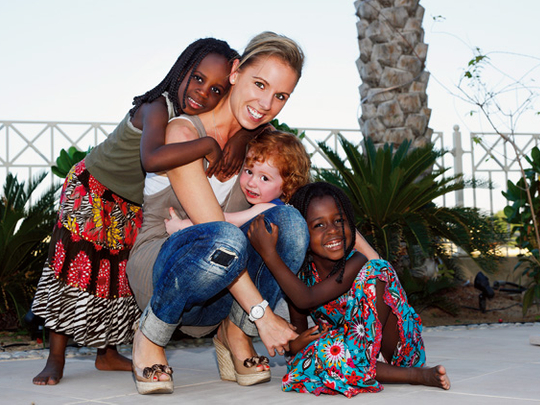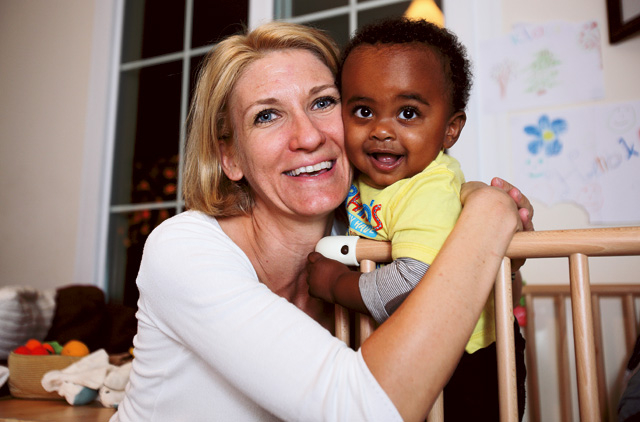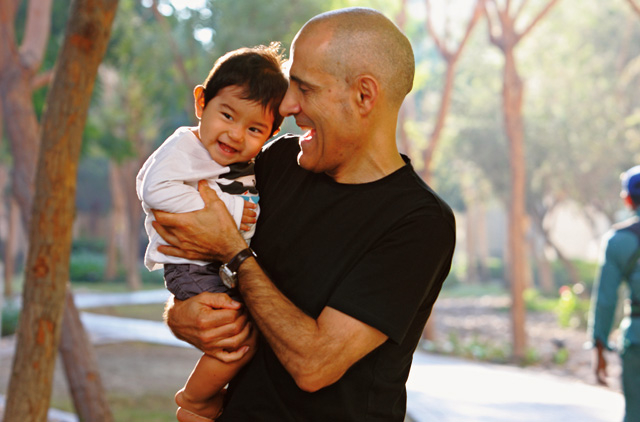
When it comes to adoption in the UAE, there are a lot of rumours and hand-me-down experiences from friends of friends to keep people hovering behind the start line. However, with the right guidance, adopting can be a safe and enjoyable process - and probably much quicker than in your home country.
Andrea Tosatto is a psychologist at Synergy Integrated Medical Centre (www.synergyctrdubai.com), where he runs the international adoption home study programmes. He says, "We must get rid of the tragic myth that adoption is not legal in the UAE - it's simply not true. There is no law regarding adoption as Islamic law doesn't recognise it. But international adoption bypasses the UAE and is processed directly between the embassy of the parents' home country and the embassy of the country they are adopting from. So, it is legal."
Getting started
Being from one country, residing in another, and adopting from yet another sounds like a bureaucratic nightmare involving endless passport photos, long queues and paperchase dead ends.
Luckily, thanks to the 1993 Hague Adoption Convention, there's an internationally recognised process with a defined start and finish. The convention was set up to protect children from child trafficking and to recognise "that intercountry adoption may offer the advantage of a permanent family to a child for whom a suitable family cannot be found in his or her State of origin." Under the Hague Convention, parents are required to provide a file of documents, undergo a police check, and complete a 12-hour home-study programme, all of which can seem off-putting. However, the risks of adopting without going through the Hague Convention are colossal - yes, you may be able to get your child into the UAE, but you may never be able to take your child to your home country. This fact alone should be enough to encourage people to follow the proper channels. If you're standing at the bottom of Hague Convention hill, wondering which is the best route up, a good place to start is the home study.
What is the Home Study?
The home study involves a psychological analysis and ten hours of parental preparation. The psychological analysis protects children from being adopted under the wrong circumstances. Clinical psychologist Sabine Skaf, who manages the home study programme at the Human Relations Institute (www.hridubai.com), says, "One of the objectives is to work out if parents require counselling - a woman may come to me in a state of depression after lots of IVF. It's my job to tell her that she isn't ready yet - to have some counselling." For men, the issue may be a fear that they won't be able to form a strong bond with the child, which would also need to be worked through first.
The results should come back in less than a week, at which point the parenting sessions can begin. Dr Tosatto says, "These are not to teach a guy how to be a good dad - there is no manual for that - but it brings up things people may not think about themselves. And the time frame is necessary - it takes nine months to create a baby so parents can prepare mentally and emotionally. The home study is a chance to do this. We have about 100 couples coming to us every year to do the home study, and a significant number of these decide not to go through with adoption."
Once the home study has been completed, you arrange a home visit and final interview, and gather your documents into a file. From this point on, the process is over to you.
Going abroad
Your home study file can only be released to one adoption agency at a time. Sabine says, "Different countries and agencies have their own regulations and rules about nationalities, ages, single parents, so people need to research this." Once you have decided on an agency, you need to get a No Objection Letter from your embassy here in the UAE, certifying that they recognise adoptions from the country of your choice, and get registered on the agency's adoption list. Then you wait for the phone to ring.
Deal breakers
According to Dr Tosatto and Sabine, certain things would ring alarm bells, or even stop an adoption process in its tracks. One is having a criminal record. Another is when one partner is more keen than the other, or if there is a sense of desperation. But ultimately, the home study is not a personal attack, it's just to make sure, for the sake of the child, that parents are completely sure of their decision. Dr Tosatto says, "Adoption should be your choice, not your last resort. Your child must be your son, in every way. Parents should not go into it feeling that it's a second-rate experience - after all, parenting an adopted children has exactly the same amount of responsibility as parenting a biological child. There is nothing lesser about the relationship, the love, or the experience - adoption is just another way of becoming a parent."
British couple Selina and Billy Smyth-Daly adopted their five-year-old daughter McKenzie from Liberia four years ago. Eight months later, they started the adoption process for Nahla, now four years old, from Sierra Leone.
Selina says: "With Kenzie, the process took about 14 months. With Nahla, it took two and a half years - her adoption was finalised two days before I went into labour with my son Logan. Four days later, Billy and my mum flew to Sierra Leone to get her. A pre-schooler, a newborn and a traumatised two-year-old made for an interesting summer.
"People ask if it feels different to parent an adopted child versus a biological child, but I can tell you it doesn't. When I saw Kenzie and Nahla's pictures for the first time, the rush of emotion was the same as when I gave birth to Logan. People say, ‘At the orphanage, I bet you wanted to bring them all home.' We didn't. We just wanted our daughters. And when they say things like, ‘Don't adopted children often have behavioural issues?' I say, ‘What if your biological child has behavioural issues? Will you give him back?' As a parent, you take what comes at you - biological or not.
"In the home study, the interracial aspect of adoption was never frowned upon. Anyone who thinks that a white mother can't learn about black hair and skin should come to my house. In our family, skin colour is not a taboo subject, and the fact that my daughters were born in Africa is also not.
"Bringing up a child is a rewarding experience, but to see them develop from an emotionally and physically horrific state into confident children has been an incredible journey - and is such an amazing gift."
Billy says: "When adopting, it's OK to feel a bit scared, because the minute you see your child, things change - the fears disappear and you love them unconditionally, just as with biological children. The only difference with adopting is that you feel special - like you've been chosen. I love my wife and all of my kids unconditionally. We area very lucky family."
Austrian Silke and Klaus Ehrenbrandtner adopted their little boy, Henok, from Ethiopia six months ago. Now, they are gearing up for the celebration of Henok's first birthday.
Silke says: "My main concern when we started looking at adopting was that we went through the right channels - I was very concerned about child trafficking and if I had been the slightest bit unsure, I couldn't have gone through with it. So we were sure we wanted to go through the Hague Convention.
"At the beginning of the home study sessions, we thought, ‘Why do they need to know all of this about our lives?' But, after a while, we found the sessions so interesting and useful - they make you think about things, such as health issues that Henok might have, issues for us as a family, racial issues that Henok might face in the future.
"We visited lots of orphanages before we chose the two that felt right for us. We decided that, even if it took longer, we would wait until one of them had a baby for us. But we were extremely lucky - only two weeks later, we got a phone call saying there was a three-month-old baby boy waiting for us, who had been found on the streets by two policemen on New Year's Eve. Six weeks later, when he was five months old, we brought him home. I spent most of that time in Addis Ababa with Henok.
"Adopting from Ethiopia was one of the best experiences... we fell in love with the place and people were so kind to us. We were given lots of blessings from Ethiopians who said they were happy we were adopting because Ethiopia has five million orphans.
"Henok has settled in well - we were a little family more or less instantly - and his personality fits perfectly… But the most impressive memory for me is the very first moment when Henok and I entered our house in Dubai. When I turned on the lights, he looked around very interested, then he turned towards me and smiled brightly."
Klaus says: "We went to Ethiopia five times in three months and I will never forget any of the days there. We had the chance to help out in the orphanages and be with the children. But the most important moment was when we finally met our son. After that, we wanted to be with him as often as possible and we were allowed to visit him whenever we wanted. Being involved in each and every part of the process helps you to understand why so many children end up in orphanages, and how you can help improve their living conditions. Adoption is only one way to help - there are so many more ways."
Italian Australian Diego Natale and Australian Francine Pinnuck adopted their ten-month-old son Gabriele from Mexico when he was just four months old, six months after starting the adoption process.
Diego says: "The whole process took us six months from when we started the home study, to when we first saw our son Gabriele. I'd definitely say that having to wait a little while is a positive thing. It gave us time to think and discuss it, which we did probably every day, often for many hours. And I think that's a good thing because choosing to have a child is the most important decision I've ever made. It's about bringing another person up in this world... about the challenges and about helping them become a happy person, and a good person. It's a responsibility which affects how successful and happy that child will be in life, and there's nothing bigger than that. It means more to me than a high-profile job, or a big house - it means devoting time and effort to this baby, to this individual. At first that may mean nurturing him with the basics but, in later years, it will mean providing him with a balanced understanding of the values of education, a healthy lifestyle, a good work ethic, and a strong sense of family and social responsibility - as well as the importance of enjoying life and having fun. Even though going through the Hague Convention was a long process, I am glad we did it because even now with the proper documentation we are finding it difficult to get Gabriele a visa to enter Australia to see his family.
"I actually enjoyed the adoption process - especially seeing and then picking up our son. He is a joy to be with and, even though I am sure there will be ups and downs, it is now a life-long journey for the three of us -a journey I am looking forward to."
Francine says: "When we decided that we wanted to adopt a child, I didn't know anything about it. We went to an adoption agency in Australia and they said we'd have to wait ten years. When I told them I live in Dubai, they gave me the number for Synergy Integrated Medical Centre.
"The home study was good because it made me reflect on what I was about to do. Also, for me and Diego to sit for hours each week and talk about it all, and talk about the potential issues... it was a great experience. Mexico has a very strict adoption process, so we had to go through lawyers, family services, courts and a psychological analysis there too, but the UAE embassy in Mexico was so helpful - I have nothing but praise for them.
"The day after our son Gabriele was born, the lawyer in Mexico called to say we had a son. I couldn't sleep from excitement. Six months later, we went to Mexico to collect Gabriele. They put him in Diego's arms and that was it -I couldn't even get a look in!
"People like to bash Dubai, but I cannot thank the place enough... When I look at Gabriele, I have to say, ‘Thank you, thank you UAE!' If we did not live in the UAE we would not have had this beautiful little boy. He makes me so happy and I am very, very lucky." A
Need to know
How much does it cost?
The home study programme at Synergy Integrated Medical Centre costs Dh7,500, plus Dh3,000 for the follow up.
How long does it take?
The home study takes two months, on average, but can be shorter or longer, depending on circumstances. After that, organising the actual adoption can take anywhere from a matter of weeks, to years.
Which countries can I adopt from?
For a list of countries that are party to the Hague Adoption Convention, visit http://adoption.state.gov/










